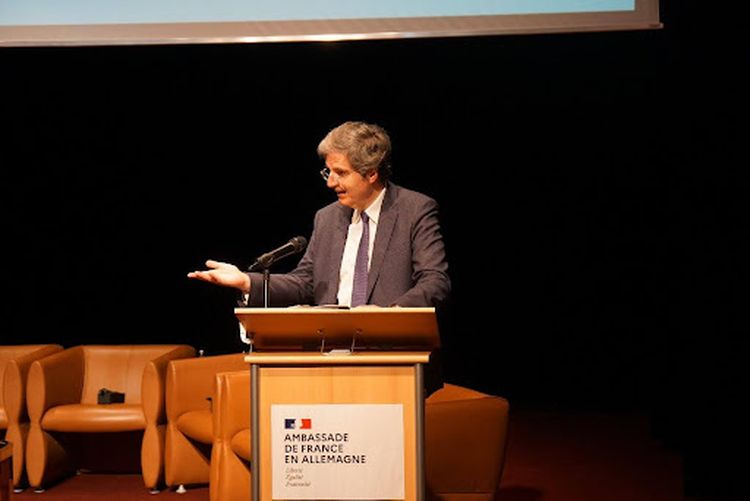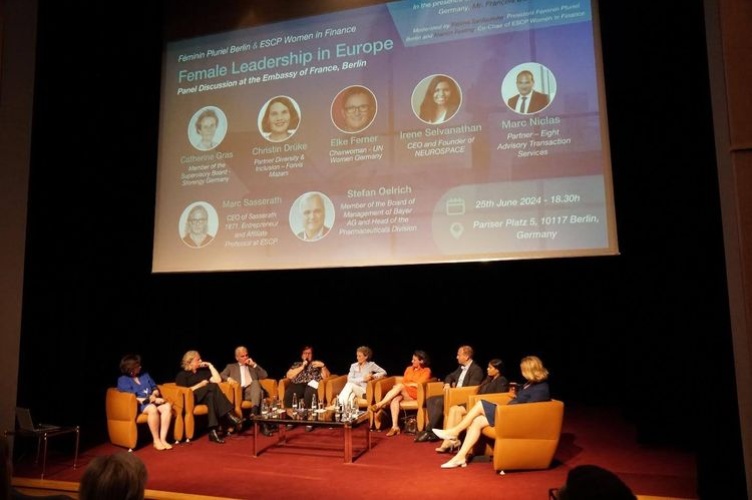“Female Leadership in Europe”
On June 25th, 2024, the ESCP Women in Finance Chair, in cooperation with Féminin Pluriel Berlin, organized an event on the topic of “Female Leadership in Europe” at the French Embassy in Berlin. The event attracted about 80 participants from various professional and cultural backgrounds, creating a diverse environment for discussing gender equity in leadership roles across Europe.
The highlights of the program included a welcome speech by the French Ambassador in Germany, François Delattre, who shared insightful reflections on the current situation of women in diplomacy and emphasized the progress and successes to date in French legislation concerning women in leadership positions. His speech set the scene for a lively and stimulating panel discussion featuring a variety of renowned experts and industry representatives.
The panelists included Elke Ferner, Chairwoman of UN Women Germany; Stefan Oelrich, President of Bayer Pharmaceuticals; Irene Selvanathan, CEO of NEUROSPACE GmbH; Marc Niclas, Partner at Transaction Services, EightAdvisory; Catherine Gras, CEO and Board Member (NED) at Storengy Germany; Marc Sasserath, Founder of Sasserath 1871 GmbH and Entrepreneur, Affiliate Professor at ESCP Business School; and Christin Drüke, Partner for Diversity & Inclusion at Forvis Mazars. The panelists shared their valuable perspectives on the current state of female leadership in Europe, and in particular in Germany and France. The emphasized the business case for developing and integrating more female leaders, and discussed strategies for promoting (more) female leadership in organizations in Europe.

What is the current situation regarding female leadership in Europe?
The discussion highlighted several key issues:
-
There is a significant need to improve the legal framework and political representation for women in Germany, where the political will and female representation for advancing laws and regulations are lacking behind especially as compared to France.
-
Achieving an equal share in top management positions solely through attrition is challenging. However, other approaches bear the risk of reverse discrimination.
-
The insufficient care infrastructure for young children and elderly family members in Germany often forces women out of the job market.
-
Moreover, women in Germany frequently drop off the talent list in organizations when they announce their pregnancy, showcasing persistent stigma.
-
Women have a hard time advancing in their careers due to biased selection practices. The similarity bias plays a particular role here as it leads male managers to tend to promote people that are like them – male.
-
Companies in all countries struggle to retain top female talent as they are often recruited by competitors for better or higher positions. It is a fierce war for female talent.
-
Job descriptions often contain biases and demand profiles and competencies that are not required for the job, which discourages qualified women from applying.
-
Last but not least, women tend to underestimate their skills and abilities, whereas men often overestimate theirs.
Why is there a need for more female leaders from a business perspective?
The panelists emphasized the importance of diversity in teams, noting that it brings in different perspectives and positively influences team dynamics. In addition, it has been shown that gender-balanced teams create a unique and diverse organizational culture. The experts stressed that the goal of female leaders should not be to mimic the behavior of male leaders, but to bring in their distinct and authentic approaches to business from which the organization as a whole can benefit tremendously.

How can we promote (more) female leadership in organizations across Europe?
Achieving gender balance in organizations requires a multifaceted approach, involving broader societal and political/legal changes, concrete organizational measures, and adjustments in individual behavior. The identified recommendations for action that were discussed include:
-
Implementing a strong legal framework in favor of gender equity, including quotas for promoting women to higher positions. The panelists agreed that women don’t need a quota to be retained, because they tend to excel once they are there – they need the quota to get into these positions in the first place.
-
Addressing gender equity as a question of social justice is indispensable, and ensuring gender-balanced commissions at the EU level is of utmost importance.
-
Leveraging the roles of Germany and France as role models for other countries.
-
Enhancing the care infrastructure in Germany to support families and especially women in balancing their care duties and to enable them to participate equally in the labor force.
-
Designing fair and transparent HR processes (recruitment, performance reviews, talent pool/promotions, compensation, etc.) that are as unbiased as possible.
-
Relying on empathy and flexibility in the collaboration with co-workers rather than rigid organizational rules (e.g., introducing strict rules for meeting times was critically discussed).
-
Educating leaders to ask the right questions and overcome biases during decision-making (e.g., by asking “Don’t we have a suitable female candidate?”).
-
Conducting mixed-group diversity and bias trainings to experience the perspectives of others and cultivate an inclusive organizational culture where people feel comfortable speaking up.
-
Creating committed top management teams dedicated to fostering gender equity and addressing existing gender biases.
-
Using data to set measurable goals for gender diversity (Following the motto “what can be measured, can be managed”).
-
Developing more female role models that inspire and others can identify with.
-
Encouraging mentality and behavioral change in women to overcome anxiety, build self-confidence, and recognize their abilities.
The event concluded with a reception in the impressive inner courtyard of the French Embassy in Berlin, providing a valuable opportunity for participants to meet, network, and continue the important conversations initiated during the panel discussion. The success of this event demonstrates the commitment to advancing gender equity in leadership on a European level and sets the stage for future discussions and initiatives planned by the Chair. We look forward to continuing this vital dialogue and driving meaningful change on this matter!
Campus
